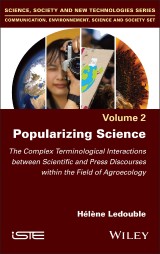Details

Popularizing Science
The Complex Terminological Interactions between Scientific and Press Discourses within the Field of Agroecology1. Aufl.
|
126,99 € |
|
| Verlag: | Wiley |
| Format: | EPUB |
| Veröffentl.: | 10.06.2024 |
| ISBN/EAN: | 9781394298990 |
| Sprache: | englisch |
| Anzahl Seiten: | 240 |
DRM-geschütztes eBook, Sie benötigen z.B. Adobe Digital Editions und eine Adobe ID zum Lesen.
Beschreibungen
<p>Media coverage of scientific issues is a highly complex process. It involves making a specialized field accessible to the general public, without necessarily disseminating the associated scientific terms or knowledge.</p> <p>The terminological interactions between press discourses and scientific knowledge are presented within the field of agroecology. The analysis of textual data focuses on articles in the general press in French and English, devoted to plant protection practices using natural mechanisms (biological control).</p> <p>This book provides a terminological and cognitive overview of the issues involved in popularizing science in a rapidly expanding field, and of the challenges to be met in the constantly evolving environmental communication sector.</p>
<p>Foreword ix<br /><i>Anne CONDAMINES</i></p> <p>Preface xiii</p> <p>Acknowledgments xv</p> <p>Introduction xvii</p> <p><b>Part 1 The Challenge of Popularizing Science 1</b></p> <p>Introduction to Part 1 3</p> <p><b>Chapter 1 The Dialogue Between Science and Society 5</b></p> <p>1.1 The popularizing project 5</p> <p>1.1.1 How we talk about popular science 6</p> <p>1.1.2 Promoting popularization 7</p> <p>1.2 Science in the media and the multiplicity of actors 10</p> <p>1.2.1 From scholarly knowledge to social knowledge 10</p> <p>1.2.2 Perspectives on science and experts 12</p> <p>1.3 Scientific and media approaches to popularization 17</p> <p>1.3.1 Divergence between scientific and media approaches 17</p> <p>1.3.2 Convergences between these approaches 20</p> <p><b>Chapter 2 Discourses on Science 25</b></p> <p>2.1 Genres in scientific communication 25</p> <p>2.2 Scientific discourse 28</p> <p>2.2.1 Terminological variation in specialized discourse 29</p> <p>2.2.2 Specialized and general language 32</p> <p>2.3 Scientific media discourse 33</p> <p>2.3.1 Language and variation in the popularization process 34</p> <p>2.3.2 Parallel between popularization and education 36</p> <p><b>Chapter 3 Theoretical and Methodological Tools for Analysis 41</b></p> <p>3.1 Identification and categorization of names and designations 41</p> <p>3.1.1 Designations in a discursive context 42</p> <p>3.1.2 Analysis and categorization of designations 43</p> <p>3.2 Characterization of objects of discourse 43</p> <p>3.2.1 Characterization of an object of discourse: media schematization 44</p> <p>3.2.2 Formal markers characterizing objects of discourse 46</p> <p><b>Part 2 Science in the Media: Agroecology in the Daily Press 49</b></p> <p>Introduction to Part 2 51</p> <p><b>Chapter 4 An Introduction to Agroecology 53</b></p> <p>4.1 Presentation of biological control 54</p> <p>4.1.1 Definition of terms and terminological instability 55</p> <p>4.1.2 Regulatory approach to plant protection 57</p> <p>4.2 Media discourse under study 59</p> <p>4.2.1 French press corpus 60</p> <p>4.2.2 English-language press corpus 61</p> <p><b>Chapter 5 Names and Designations of Discourse Objects 63</b></p> <p>5.1 Designations of plant protection methods 63</p> <p>5.1.1 Protection methods in French 63</p> <p>5.1.2 Control methods in English 69</p> <p>5.1.3 Summary of method designations 71</p> <p>5.2 Designations of agents and plant protection products 73</p> <p>5.2.1 Biocontrol agents (insects) 73</p> <p>5.2.2 Biocontrol products 76</p> <p>5.2.3 Summary of product designations 79</p> <p><b>Chapter 6 Characterization of Discourse Objects 81</b></p> <p>6.1 Crossed perspectives on methods and products 81</p> <p>6.1.1 Complementarity of methods and products 82</p> <p>6.1.2 Opposition between methods and products 87</p> <p>6.1.3 Synthesis of oppositions and binarism 92</p> <p>6.2 Simplified look at methods and products 93</p> <p>6.2.1 Simplification through (co)textual structures 93</p> <p>6.2.2 Simplification by analogical reasoning 94</p> <p><b>Part 3 Challenges in the Mediation of Agroecological Issues 97</b></p> <p>Introduction to Part 3 99</p> <p><b>Chapter 7 Terminological and Cognitive Issues 101</b></p> <p>7.1 Designations and specialization 101</p> <p>7.1.1 Semantic shift between areas of expertise 102</p> <p>7.1.2 Determinologization 104</p> <p>7.1.3 Designations and connotations 106</p> <p>7.1.4 Name equivalents in discourse 111</p> <p>7.1.5 Agent and product status 112</p> <p>7.2 Binarism and cognitive bias 114</p> <p>7.2.1 Strengths and weaknesses of binary reasoning 114</p> <p>7.2.2 Strengths and weaknesses of analogical reasoning 123</p> <p><b>Chapter 8 Challenges in Agroecology 129</b></p> <p>8.1 A shared responsibility 129</p> <p>8.1.1 The connection between content and style 130</p> <p>8.1.2 Development is inseparable from dissemination 136</p> <p>8.2 Scientific mediation 137</p> <p>8.2.1 Reflexivity and scientific mediation 138</p> <p>8.2.2 Language and terminology 143</p> <p>8.2.3 Involving the public 149</p> <p>Conclusion 159</p> <p>Glossary 167</p> <p>References 171</p> <p>Index 193</p>
<p><b>Hélène Ledouble</b> is an associate professor at the University of Toulon, France. She works in applied linguistics and textual data analysis, and is particularly interested in popular science discourse on environmental issues.</p>


















